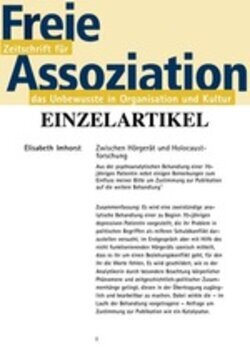16 Seiten, PDF-E-Book
Erschienen: März 2005
Bestell-Nr.: 21044
abonnieren
Elisabeth Imhorst
Zwischen Hörgerät und Holocaustforschung (PDF)
Freie Assoziation 2005, 8(1), 53-68
Sofortdownload
Dies ist ein E-Book. Unsere E-Books sind mit einem personalisierten Wasserzeichen versehen,
jedoch frei von weiteren technischen Schutzmaßnahmen (»DRM«).
Erfahren Sie hier mehr zu den Datei-Formaten.
Es wird eine zweistündige analytische Behandlung einer zu Beginn 70-jährigen depressiven Patientin vorgestellt, die ihr Problem in politischen Begriffen als reiferen Schuldkonflikt darzustellen versucht, im Erstgespräch aber mit Hilfe des nicht funktionierenden Hörgeräts szenisch mitteilt, dass es ihr um einen Beziehungskonflikt geht, für den ihr die Worte fehlen. Es wird geschildert, wie es der Analytikerin durch besondere Beachtung körperlicher Phänomene und zeitgeschichtlich-politischer Zusammenhänge gelingt, diesen in der Übertragung zugänglich und bearbeitbar zu machen. Dabei wirkte die – im Laufe der Behandlung vorgetragene – Anfrage um Zustimmung zur Publikation wie ein Katalysator.
Abstract:
The analytic psychotherapy with two weekly sessions of a 70 year old female depressed patient is presented. Whereas the patient attempts to address her problem as a more mature conflict about guilt by employing political terms, already during the first interview the unspoken relational conflict becomes apparent between analyst and patient and is expressed scenically by means of the patient’s disfunctional hearing aid. The analyst will show how her careful attention to body phenomena and to the historical-political context of the patients past enable her access this conflict and work on this in the transference. In addition, she notes how the request to publish her work in progress acts as a catalyst for the ongoing treatment.
Abstract:
The analytic psychotherapy with two weekly sessions of a 70 year old female depressed patient is presented. Whereas the patient attempts to address her problem as a more mature conflict about guilt by employing political terms, already during the first interview the unspoken relational conflict becomes apparent between analyst and patient and is expressed scenically by means of the patient’s disfunctional hearing aid. The analyst will show how her careful attention to body phenomena and to the historical-political context of the patients past enable her access this conflict and work on this in the transference. In addition, she notes how the request to publish her work in progress acts as a catalyst for the ongoing treatment.
Rolf-Peter WarsitzS. 7–18»Um des Lebens willen bereite dich auf den Tod vor« (PDF)
Freie Assoziation 2005, 8(1), 7-18Eike HinzeS. 19–28Trauma, Persönlichkeit, Alter und der Traum des Analytikers von Veränderung (PDF)
Freie Assoziation 2005, 8(1), 19-28Peter KutterS. 29–39Seelische Folgen politischer Verhältnisse bei Älteren (PDF)
Freie Assoziation 2005, 8(1), 29-39Joshua DurbanS. 41–51Angst und Sinnhaftigkeit im Schatten des Todes - die Analyse eines 84-jährigen Mannes (PDF)
Freie Assoziation 2005, 8(1), 41-51Elisabeth ImhorstS. 53–68Zwischen Hörgerät und Holocaustforschung (PDF)
Freie Assoziation 2005, 8(1), 53-68Hildegard SchäferS. 69–82Kindheit im Niemandsland (PDF)
Freie Assoziation 2005, 8(1), 69-82Hartmut RadeboldS. 83–89Zeitgemäßes über Krieg und Tod. Abschließende Reflektionen (PDF)
Freie Assoziation 2005, 8(1), 83-89
Freie Assoziation 2005, 8(1), 7-18Eike HinzeS. 19–28Trauma, Persönlichkeit, Alter und der Traum des Analytikers von Veränderung (PDF)
Freie Assoziation 2005, 8(1), 19-28Peter KutterS. 29–39Seelische Folgen politischer Verhältnisse bei Älteren (PDF)
Freie Assoziation 2005, 8(1), 29-39Joshua DurbanS. 41–51Angst und Sinnhaftigkeit im Schatten des Todes - die Analyse eines 84-jährigen Mannes (PDF)
Freie Assoziation 2005, 8(1), 41-51Elisabeth ImhorstS. 53–68Zwischen Hörgerät und Holocaustforschung (PDF)
Freie Assoziation 2005, 8(1), 53-68Hildegard SchäferS. 69–82Kindheit im Niemandsland (PDF)
Freie Assoziation 2005, 8(1), 69-82Hartmut RadeboldS. 83–89Zeitgemäßes über Krieg und Tod. Abschließende Reflektionen (PDF)
Freie Assoziation 2005, 8(1), 83-89

